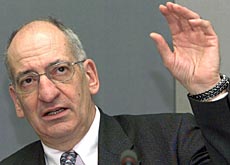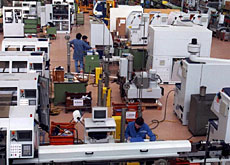Couchepin admits economic recession

The economics minister, Pascal Couchepin, has admitted that new figures released by the government show that the Swiss economy was in recession throughout most of 2001.
He was speaking a day after officials in his ministry played down talk of a recession.
Interviewed on Friday by the mass-circulation “Blick” newspaper, Couchepin said Switzerland had been “technically” in recession.
“But it was a recession with positive signs of private consumption,” he said.
Couchepin’s State Secretariat for Economic Affairs (Seco) was forced on Thursday to issue revised figures for 2001, showing economic contraction for the year as a whole.
But while the figures fulfilled all the criteria for use of the word “recession”, Seco chief economist, Aymo Brunetti, chose to speak in terms of “clear stagnation”.
He said not all branches of the economy had experienced a downturn.
The revised GDP figures for 2001 showed a decline of 0.2 per cent in the second quarter, a fall of 1.0 per cent in the third quarter, and a 0.9 per cent drop in the last quarter followed by a 0.2 per cent decline in the first quarter of 2002.
Recession went unnoticed
Couchepin admitted the signs of recession had taken the government by surprise.
“No one noticed,” he told the Blick. “Consumer confidence was strong, so we didn’t notice that the situation in the export industry was much worse than anticipated.”
Government economists had initially forecast economic growth of 1.3 per cent for 2001.
Couchepin said the over-optimistic assessment of the economy was due to the provisional figures, which overestimated the investment climate.
And he said he continued to remain confident about the economy, which managed a meagre 0.4 per cent growth in the second quarter of 2002.
“I’d rather see through rose-coloured spectacles than through black ones. Because that thinking has aided consumer confidence.”
Speaking on Friday, the economics minister said another reason for optimism was that Switzerland was coping with its economic problems better than its neighbours.
As soon as the European and world economies picked up, Switzerland would start to experience growth again, he said.
But analysts believe the recession may still not have run its course.
“It looks as if investment will continue to shrink, and banking and services will have problems,” said Janwillem Acket, chief economist at Julius Baer bank.
swissinfo with agencies
Government economists had initially forecast economic growth of 1.3 per cent for 2001.
The revised GDP figures for 2001 showed a decline of 0.2 per cent in the second quarter.
GDP fell by 1.0 per cent in the third quarter and 0.9 per cent drop in the last quarter.
In the first quarter of 2002 it dropped by 0.2 per cent.
The economy grew by 0.4 per cent in the second quarter of 2002.

In compliance with the JTI standards
More: SWI swissinfo.ch certified by the Journalism Trust Initiative

You can find an overview of ongoing debates with our journalists here. Please join us!
If you want to start a conversation about a topic raised in this article or want to report factual errors, email us at english@swissinfo.ch.